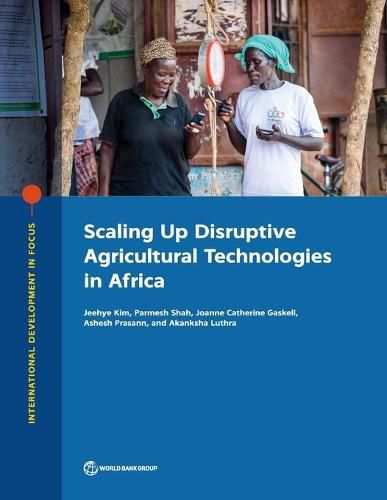Readings Newsletter
Become a Readings Member to make your shopping experience even easier.
Sign in or sign up for free!
You’re not far away from qualifying for FREE standard shipping within Australia
You’ve qualified for FREE standard shipping within Australia
The cart is loading…






This study which includes a pilot intervention in Kenya aims to further the state of knowledge about the emerging trend of disruptive agricultural technologies (DATs) in Africa, with a focus on supply-side dynamics. The first part of the study is a stocktaking analysis to assess the number, scope, trend, and characteristics of scalable disruptive technology innovators in agriculture in Africa. From a database of 434 existing DAT operations, the analysis identified 194 as scalable. The second part of the study is a comparative case study of Africa’s two most successful DAT ecosystems in Kenya and Nigeria, which together account for half of Sub-Saharan Africa’s active DATs. The objective of these two case studies is to understand the successes, challenges, and opportunities faced by each country in fostering a conducive innovation ecosystem for scaling up DATs. The case study analysis focuses on six dimensions of the innovation ecosystem in Kenya and Nigeria: finance, regulatory environment, culture, density, human capital, and infrastructure. The third part of the study is based on the interactions and learning from a pilot event to boost the innovation ecosystem in Kenya. The Disruptive Agricultural Technology Innovation Knowledge and Challenge Conference in Nairobi, Kenya, brought together more than 300 key stakeholders from large technology companies, agribusiness companies, and public agencies; government representatives and experts from research and academic institutions; and representatives from financial institutions, foundations, donors, and venture capitalists. Scaling Up Disruptive Agricultural Technologies in Africa concludes by establishing that DATs are demonstrating early indications of a positive impact in addressing food system constraints. It offers potential entry points and policy recommendations to facilitate the broader adoption of DATs and improve the overall food system.
$9.00 standard shipping within Australia
FREE standard shipping within Australia for orders over $100.00
Express & International shipping calculated at checkout
This study which includes a pilot intervention in Kenya aims to further the state of knowledge about the emerging trend of disruptive agricultural technologies (DATs) in Africa, with a focus on supply-side dynamics. The first part of the study is a stocktaking analysis to assess the number, scope, trend, and characteristics of scalable disruptive technology innovators in agriculture in Africa. From a database of 434 existing DAT operations, the analysis identified 194 as scalable. The second part of the study is a comparative case study of Africa’s two most successful DAT ecosystems in Kenya and Nigeria, which together account for half of Sub-Saharan Africa’s active DATs. The objective of these two case studies is to understand the successes, challenges, and opportunities faced by each country in fostering a conducive innovation ecosystem for scaling up DATs. The case study analysis focuses on six dimensions of the innovation ecosystem in Kenya and Nigeria: finance, regulatory environment, culture, density, human capital, and infrastructure. The third part of the study is based on the interactions and learning from a pilot event to boost the innovation ecosystem in Kenya. The Disruptive Agricultural Technology Innovation Knowledge and Challenge Conference in Nairobi, Kenya, brought together more than 300 key stakeholders from large technology companies, agribusiness companies, and public agencies; government representatives and experts from research and academic institutions; and representatives from financial institutions, foundations, donors, and venture capitalists. Scaling Up Disruptive Agricultural Technologies in Africa concludes by establishing that DATs are demonstrating early indications of a positive impact in addressing food system constraints. It offers potential entry points and policy recommendations to facilitate the broader adoption of DATs and improve the overall food system.